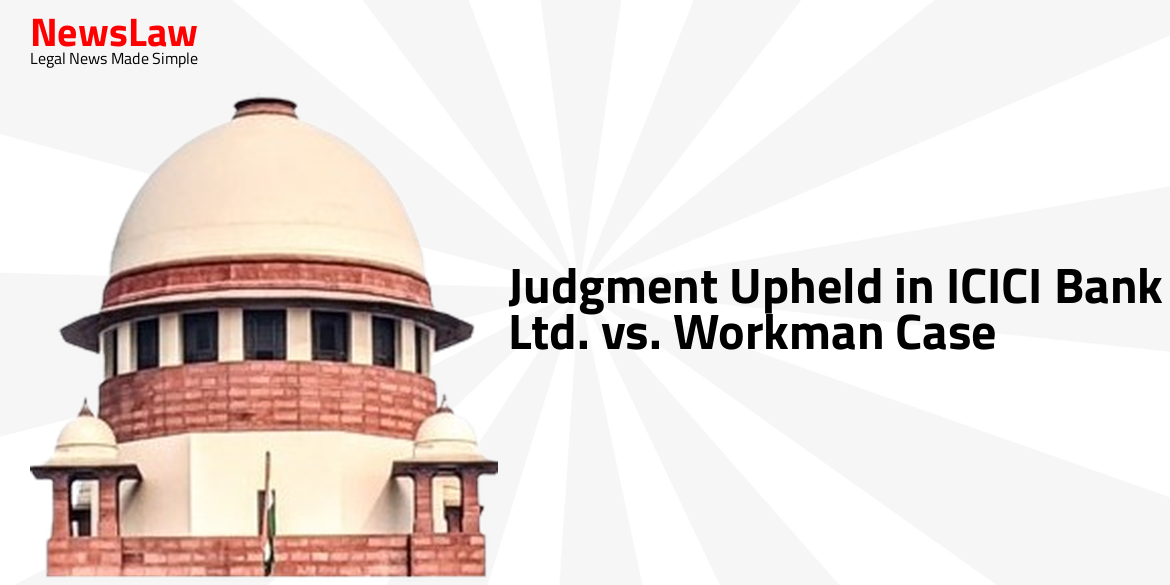In a recent ruling by the Delhi High Court, the judgment in the ICICI Bank Ltd. vs. Workman case has been upheld. The case revolves around the termination of the workman by ICICI Bank Ltd., claiming abandonment of service. The court’s decision reaffirms the workman’s classification and challenges raised by the petitioner. This legal battle sheds light on the nuances of labor law and employee rights in the corporate sector.
Facts
- ICICI Bank Ltd. terminated the employment of the respondent workman due to abandonment of service on his own account.
- The respondent workman filed a representation against termination before the Assistant Labour Commission (Central).
- The Labour Court partly allowed the dispute and deemed the termination as illegal and unjustified.
- The respondent workman was classified as holding an administrative and policy making role.
- The Court directed for the reinstatement of the respondent workman but rejected the claim for back wages.
- The petitioner sought to quash the award stating breach of bank rules as grounds for termination.
- The petitioner claimed that the respondent workman’s role was administrative and supervisory, not as a ‘workman’.
- A notice was issued to the petitioner after the workman raised an industrial dispute.
- The conciliation proceedings failed as per the certificate issued by the Conciliation Officer in 2013.
- The main dispute arises from the workman’s unauthorized absence and subsequent termination by the petitioner bank.
Issue
- The issue in question is whether the claimant falls within the definition of ‘workman’ as provided under Section 2(s) of the Act.
- After hearing submissions from both parties and examining the evidence, the Labour Court concluded that the claimant does indeed fall under the definition of a ‘workman’.
- The decision was reached after a thorough analysis of the arguments presented by both sides.
Arguments
- The action of the Petitioner is not maintainable under the Act.
- Petitioner bank was not aware of the medical condition of the Employee as no medical records were provided.
- The Labour Court failed to consider all facts and circumstances, making the award erroneous.
- The Petition should be allowed and reliefs granted as requested.
- The Employee voluntarily abandoned services of the Bank by continuous unnotified absence.
- The Labour Court’s decision disregarded cross-examination of the Employee and the bank’s authorities.
- Burden of proof cannot be shifted to the Petitioner to establish Employee’s workman status when the Employee admitted to administrative work.
- Industrial Dispute Act’s provisions should be liberally interpreted to benefit the workman.
- The claimant is held to be a workman based on the discussion and evidence provided.
- An employer must issue show cause notice and conduct a formal inquiry for unexcused absences before taking action.
- Petitioner argues that the respondent is not a workman under the Act due to his administrative and supervisory role.
- Petitioner contends that the respondent voluntarily absented himself from services.
- Petitioner claims that the Labour Court did not adequately consider these key points in its award.
Analysis
- The Court analyzed the findings arrived at by the Labour Court.
- The complainant presented a list of duties which was not disputed by the appellants.
- The court noted that the workman never appeared in the petition despite several opportunities.
- No regular inquiry was conducted by the management against the workman for unauthorized absenteeism.
- The expression ‘workman’ was given extended connotation in this part of the judgment.
- The petitioner bank was required to conduct a formal inquiry against delinquent officials before termination.
- The Court held that administrative duties or participation in policy-making meetings are not sufficient to exclude one from the definition of a workman.
- Even in the case of unauthorized leave by the workman, it could not be concluded that he intended to abandon employment as he was undergoing treatment for injuries.
- The issues were resolved in favor of the claimant and against the Management Bank.
- The Court deliberated on the entitlement of the claimant to reinstatement with full back wages or reasonable compensation.
- Different expressions were used to describe the consequence of termination without complying with Section 25F of the Act.
- The management was required to provide substantial evidence to prove the specific nature of supervisory or managerial work performed by the workman.
- The Court emphasized the need for cogent evidence to substantiate claims of supervisory nature of work performed by the workman.
- Abandonment of service means an act of intentionally or voluntarily abandoning service.
- The intention of abandonment of job by an employee depends upon his intention.
- For termination, there has to be positive action on the part of the employer, while abandonment of service is a consequence of unilateral action by the employee.
- Absence beyond prescribed period for leave can lead to resignation without the need for inquiry or notice.
- Absence from duty, if for a very long period, may amount to voluntary abandonment of service.
- The burden of proof in determining workman status should depend on facts and pleadings of each case.
- Designation alone is not decisive in determining workman status; nature of duties and functions must also be considered.
- Unauthorised absence from duty can lead to termination without a formal inquiry.
- Termination of employment deemed untenable as it was due to medical reasons
- Absence was not voluntary abandonment of service
- Petitioner failed to establish a case in their favor
- Labour Court’s decision based on facts, circumstances, and legal principles
- Court declines to interfere with the Labour Court’s award
Decision
- The instant petition has been dismissed along with any pending applications.
- The Court finds no merit in the petition.
- The impugned award dated 25 June, 2018, passed by the Presiding Officer, CGIT-cum-Labour Court No. 1, Dwarka Courts, New Delhi in ID No 13/2014 is upheld.
Case Title: ICICI BANK LTD. Vs. UNION OF INDIA AND ANR. (2024:DHC:4478)
Case Number: W.P.(C)-12738/2018



